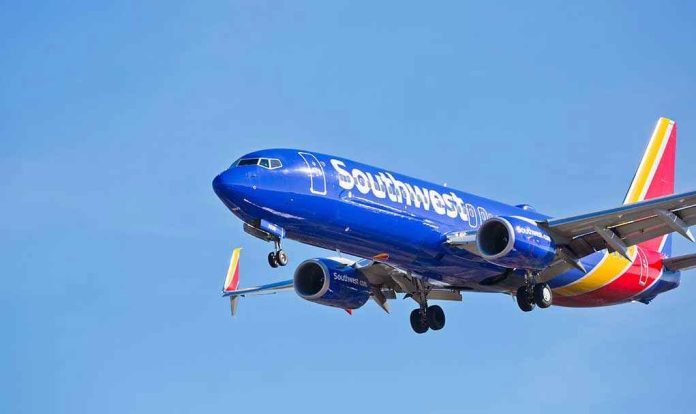
Bodycam footage exposing a Southwest pilot’s failed sobriety test just moments before a commercial flight has reignited national debate over airline safety and regulatory accountability, leaving many Americans questioning whether enough is being done to protect passengers from reckless endangerment in the skies.
Story Snapshot
- Southwest Airlines pilot David Allsop was arrested after failing sobriety tests before a scheduled flight, as revealed by newly released bodycam video.
- The FAA swiftly revoked Allsop’s commercial pilot certificate; Southwest Airlines immediately terminated his employment.
- The incident delayed the Chicago-bound flight for nearly five hours, directly impacting passengers and raising public safety concerns.
- This case spotlights the effectiveness of airport security protocols and the zero-tolerance approach to alcohol violations in aviation.
Bodycam Footage Raises Serious Safety and Accountability Concerns
On January 15, 2025, at Savannah/Hilton Head International Airport, TSA agents detected the odor of alcohol on Captain David Allsop, scheduled to fly Southwest Flight 3772 to Chicago. Law enforcement confronted Allsop in the cockpit, where he admitted to drinking beers the night before. The subsequent bodycam footage, released in August 2025, shows Allsop failing two out of three field sobriety tests and refusing a blood test. The transparency of the video has intensified calls for greater oversight, as Americans demand assurance that such failures in protocol are not repeated.
FAA regulations strictly prohibit pilots from operating an aircraft within eight hours of consuming alcohol, setting a maximum blood alcohol content of 0.04%. Allsop’s admission and failed tests fundamentally violated these standards. The immediate intervention by TSA and law enforcement prevented a potential disaster, but the incident also delayed the flight for nearly five hours, causing significant inconvenience to passengers. Such events erode public trust and prompt questions about whether current screening protocols are sufficient to ensure crew sobriety and passenger safety.
Swift Regulatory and Corporate Response Demonstrates Zero Tolerance
Following Allsop’s arrest, Southwest Airlines requested custody for an internal investigation, ultimately terminating his employment after the FAA revoked his pilot certificate in July 2025. Both the airline and the FAA emphasized their zero-tolerance approach to alcohol violations, issuing public statements underscoring their commitment to passenger safety. The affected flight eventually departed with a new captain, but the disruption and reputational damage serve as reminders of the high stakes involved when regulatory and corporate safeguards are tested.
This incident mirrors past challenges in the aviation industry, such as the 1990 Northwest Airlines case, which led to increased scrutiny and stricter alcohol testing protocols. Despite these reforms, the Allsop case reveals that gaps remain—requiring continued vigilance, robust enforcement, and possibly new measures, like mandatory pre-flight breathalyzer tests for all flight crew, to prevent future lapses.
Broader Aviation Industry Impact and Ongoing Debate
The Allsop incident has renewed calls for the aviation industry to review and potentially tighten alcohol testing protocols. Experts argue that while this case demonstrates the system’s ability to catch and address violations, it also exposes vulnerabilities that could be exploited if vigilance wanes. The economic implications for Southwest include operational disruption, replacement costs, and potential legal exposure. Socially, the event has heightened public concern over flight safety and pilot fitness—a core issue for families and frequent travelers who rely on airlines to uphold the highest standards of responsibility.
Newly released video shows Southwest pilot admitting to drinking 'three beers' before failed sobriety test https://t.co/HeLgMR1Nim #FoxNews Now the question is how many damn times has this man flown under the influence? Fucking unbelievable.
— CallieBenson (@CallieforTrump) August 19, 2025
Industry analysts point out that the transparency afforded by the released bodycam footage sets a new standard for accountability in aviation incidents. However, they caution against overreaction, noting the rarity of such events compared to the vast number of daily flights. Academic voices advocate for a balanced approach—combining strict enforcement with support systems for pilots facing psychological and occupational pressures. Ultimately, the Allsop case highlights both the strengths and weaknesses of current protocols and the need for ongoing, common-sense reforms that protect passengers without imposing unnecessary burdens on responsible crew members.
Sources:
Bodycam Footage Shows Pilot’s Arrest





